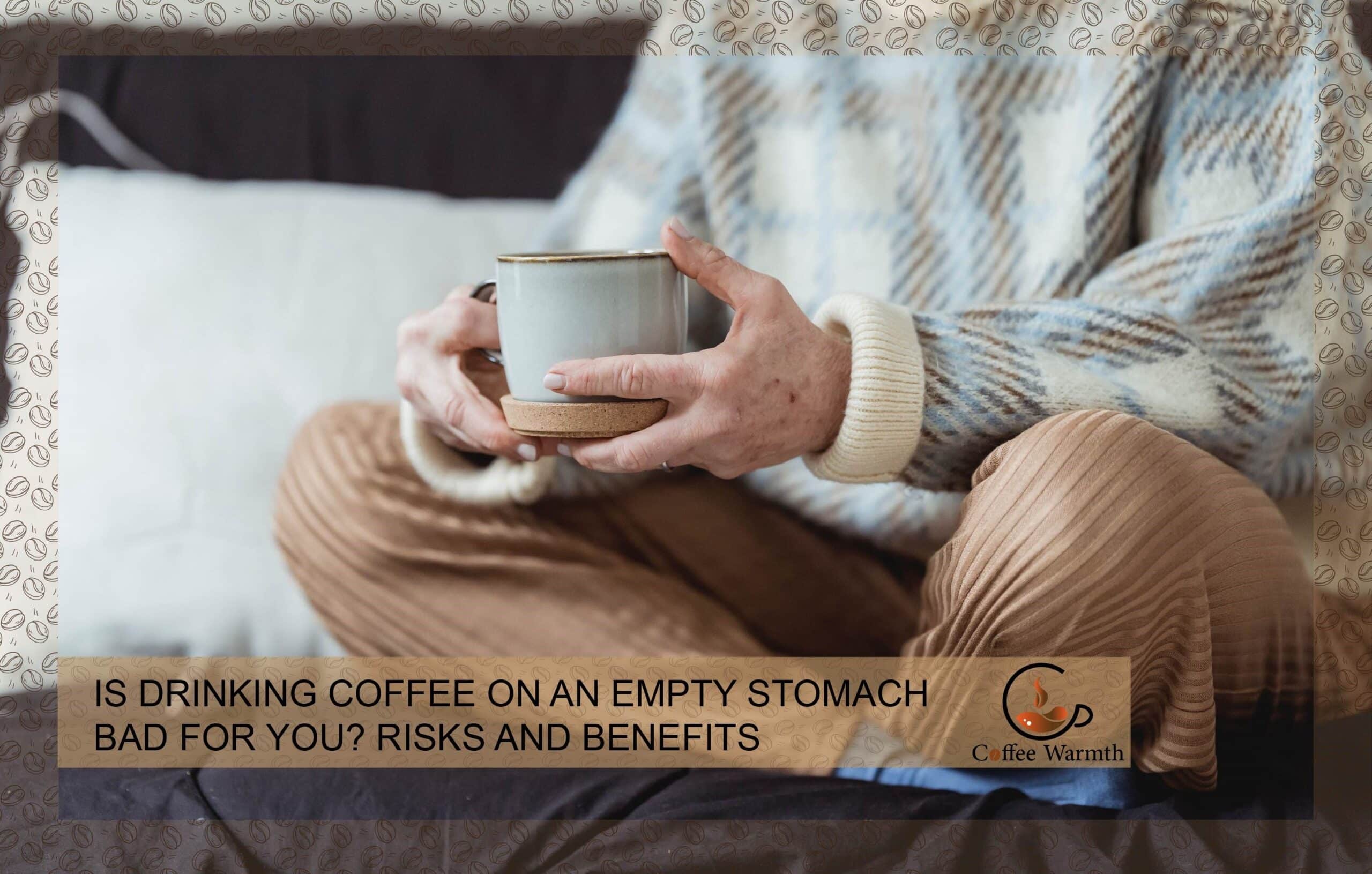Drinking coffee on an empty stomach is generally bad for you but has positive benefits for healthy individuals. 9 out of 10 coffee consumers drink coffee first thing in the morning because they feel alert and refreshed according to the National Coffee Association. Several studies have suggested that it helps you to poop and lose weight as well.
Drinking coffee on an empty stomach has its downsides for people with sensitive digestive systems, diagnosed anxiety disorders, and regular consumers. It can lead to gastric ulcers, increase in stress, restlessness, and caffeine tolerance. It can increase the secretion of gastric acid and cortisol hormone which negatively impacts those already diagnosed with certain diseases. Despite the complications, people consume coffee on an empty stomach out of habit and on the basis of societal and cultural preferences.
So, the best time to drink coffee in the morning is after having your breakfast around 9-11 am. Drinking coffee regularly during this time will save you from raising your blood sugar levels and prevent nausea associated with eating on an empty stomach.
What are the side effects and risks of drinking coffee on an empty stomach?
The side effects and risks of drinking coffee on an empty stomach are damage to the stomach lining, gastric ulcers, cortisol imbalance, anxiety and restlessness, caffeine tolerance, impaired glucose tolerance, and thyroid imbalance. Impaired glucose tolerance and thyroid imbalance are rare effects, though others occur more commonly.
The image below lists the aforementioned side effects and risks of drinking coffee on an empty stomach.
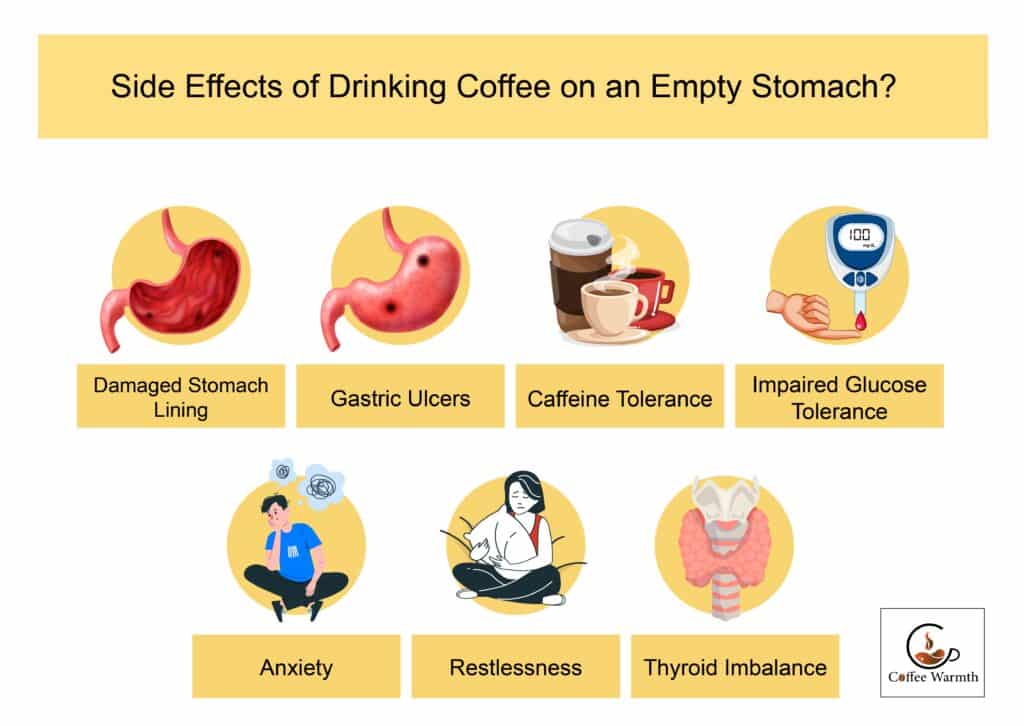
The following researches from the Journal of Biomedical and Biological Sciences, Nutrients,Journal of Biobehavioral Medicine, Sports Medicine, Psychological Reports, British Journal of Nutrition, and Clinical Thyroidology have confirmed risks of drinking coffee on an empty stomach.
Stomach Lining Damage
Dr. Sidney Cohen, gastroenterologist from Philadelphia, states that drinking coffee on an empty stomach increases gastric acid secretion by activating the bitter taste receptors in the stomach. High gastric acid secretion causes gastritis and damages the mucosal lining in the stomach according to the Journal of Biomedical and Biological Sciences.
Gastric Ulcers
According to Dr. Bhupinderjit S Anand of Baylor College of Medicine Houston, gastric acid secretion causes damage to mucosal lining and leads to formation of gastric ulcers. A study published in ‘Nutrients’ states drinking 3 or more cups of coffee a day is associated with 32% more risk of gastric ulcer formation than those drinking less than one cup.
Cortisol Imbalance
According to a study in the Journal of Biobehavioral Medicine, cortisol response to caffeine is reduced in those who consume coffee on an empty stomach daily. Anette Harris from University of Bergen found that drinking coffee on an empty stomach leads to cortisol imbalance.
Anxiety and restlessness
According to a study published in Sports Medicine, drinking a cup of coffee early in the morning increases pre-performance anxiety. Another study published in Psychological Reports concluded that subjects who drank caffeinated coffee in the morning showed greater anxiety and restlessness.
Caffeine Tolerance
Dr. William R. Lovallo, from VA Medical Center and OU Health Sciences Center, says in his research that caffeine tolerance builds in response to drinking coffee on an empty stomach in the morning daily. The physiological effects of caffeine reduce due to cortisol imbalance.
Impaired Glucose Tolerance
A study published in the journal ‘Nutrients’ in 2023 shows drinking coffee first thing in the morning decreases glucose tolerance. Another study in the British Journal of Nutrition reports a morning cup of caffeinated coffee increases glucose levels by 50%.
Thyroid Imbalance
A study published in 2022 in Clinical Thyroidology reports that drinking coffee on an empty stomach interferes with the function of levothyroxine, a drug used for hypothyroidism. The researchers state that skipping coffee on an empty stomach or delaying it for 4 hours after waking up improved thyroid hormone levels in patients with hypothyroidism.
How does Coffee on an Empty Stomach Cause Digestive Issues? (H3)
Coffee on an empty stomach causes digestive issues by secreting gastric or stomach acid. Bitterness of coffee stimulates taste receptors which secrete gastric acid. As the stomach is empty, there’s no food to protect the stomach lining. Damage to stomach lining by drinking coffee causes gastrointestinal symptoms.
When answering “does gastric acid damage the stomach lining”, we point to a study in the Journal ‘Gut’ which reports that high gastric acid level damages the stomach lining and causes gastritis. Chronic gastritis, inflammation of stomach lining, leads to ulcers due to long-term stomach lining erosion.
Another study published in 2012 in Annals and Essences of Dentistry reports that caffeine in coffee disrupts the acid-alkaline balance in the stomach and causes a permanent acid environment. The acid environment causes inflammation and erosion of stomach lining leading to gastric ulcers.
The diagram below depicts how drinking coffee can cause digestive issues on an empty stomach.
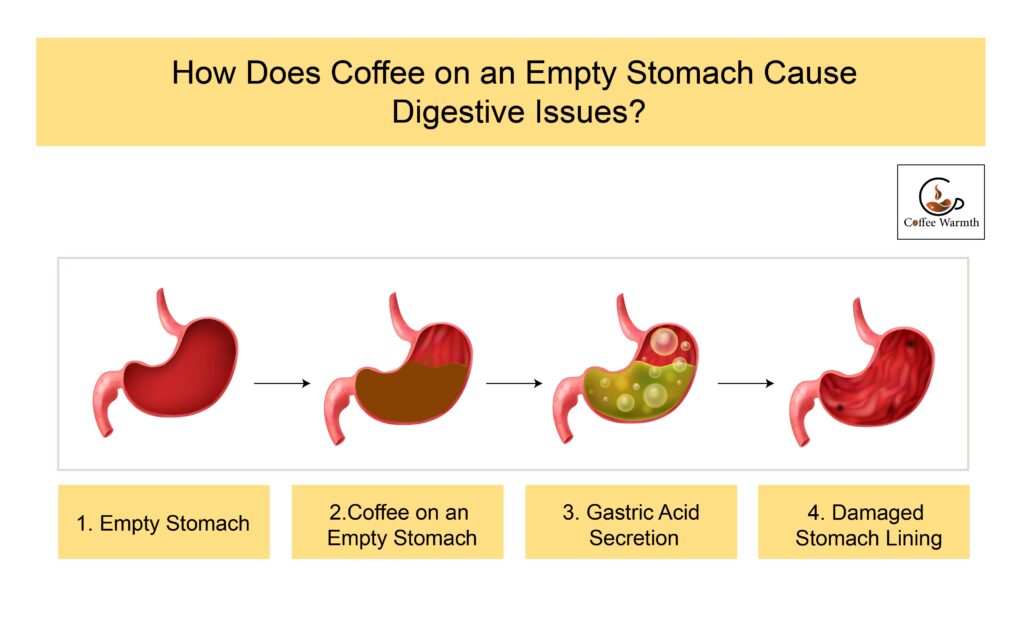
Prof. Dinesh C. Sharma describes in his study that drinking coffee on an empty stomach increased incidence of gastrointestinal symptoms in 40% of the participants. The symptoms included heartburn, gastroesophageal reflux disease (GERD), and indigestion. These symptoms are caused due to stomach lining damage and formation of gastric ulcers.
Does coffee on an empty stomach cause ulcers? H4
Yes, coffee on an empty stomach can cause ulcers in the stomach due to secretion of gastric acid. Coffee bitterness activates special taste receptors also known as type 2 bitter receptors (TAS2Rs) and inhibits certain enzymes, according to a study published in 2017 in PNAS. These steps skyrocket gastric acid levels in the stomach which can cause gastric ulcers.
Gastric acid destroys the stomach lining during the absence of food. Destruction of the stomach mucosa brings about interruptions in the otherwise smooth lining giving rise to ulcers.
It’s important to note that ulcers occur by drinking coffee on an empty stomach on a daily basis.
Does Coffee on Empty Stomach Raise Stress Hormone? H3
Coffee on an empty stomach may or may not raise stress hormone or cortisol levels depending on whether you consume coffee regularly or not. Cortisol hormone naturally peaks during the morning. Drinking coffee on an empty stomach stimulates cortisol production which causes a temporary rise in its level. This small, temporary rise may increase stress in already anxious individuals according to a study published in Psychosomatic Medicine. However, temporary cortisol increase doesn’t cause significant stress disorders.
In contrast, drinking coffee on an empty stomach regularly may lead to reduced cortisol response. A study published in Psychosomatic Medicine recruited 96 individuals to test cortisol response to caffeine. The authors suggest daily caffeine intake of 300 mg in the morning reduces cortisol production by action of hypothalamic-pituitary-adrenocortical axis (HPAC) or stress response system. Thus, coffee on an empty stomach can disrupt normal functioning of the stress hormone.
What are the benefits of drinking coffee on an empty stomach?
The benefits of drinking coffee on an empty stomach are: helps to poop, increases alertness, boosts metabolism rate, and helps in weight loss as shown in the image below.
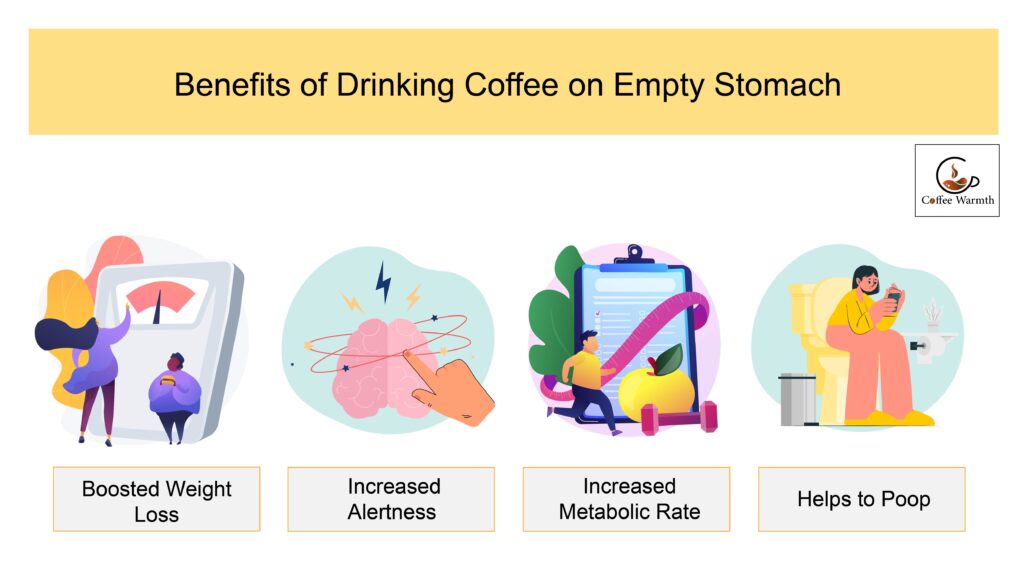
The following researches and expert guidance illustrates these benefits of drinking coffee on an empty stomach which are also the general benefits of drinking coffee.
Helps to Poop
Drinking coffee on an empty stomach promotes colonic motor activity which moves the waste material towards the rectum to pass as stool, as mentioned in Scandinavian Journal of Gastroenterology.
Increases Alertness
A study published in World Journal of Pharmaceutical and Medical Research states drinking coffee in the early morning on an empty stomach increased alertness in healthy individuals. There was an increase in alertness and focus after drinking 2-3 cups or 200-300 mg caffeine coffee.
Boosts Metabolism Rate
D. Bracco from University of Lausanne, Switzerland, suggests drinking a 150 ml cup of coffee having 80-110 mg caffeine improves carbohydrate and lipid metabolism. In the American Journal of Clinical Nutrition, a study concluded that taking 4 mg/kg caffeine in coffee on an empty stomach or anytime in a day increases metabolic rate in both obese and normal weight individuals.
Helps in Weight Loss
A review in the International Journal of Food Sciences and Nutrition concludes that drinking coffee 3.5-4 hours before a meal or on an empty stomach decreases food intake helping in weight loss. A study published in the International Journal of Environmental Research and Public Health shows drinking 1-2 cups of coffee on an empty stomach increases energy levels and physical activity which boosts weight loss.
Does drinking coffee on an empty stomach help you lose weight?
Yes, drinking coffee on an empty stomach helps you lose weight by increasing metabolism, energy levels, and suppressing appetite.
K J Acheson, Department of Nutrition of Nestle Research Center, Lausanne, Switzerland, suggests drinking 4 mg/kg caffeinated coffee on an empty stomach increases metabolic rate by 34 kJ(m2. hr).
Coffee on an empty stomach increases metabolic rate by promoting lipid oxidation and energy levels by blocking adenosine receptors in the brain. Increased energy level leads to enhanced physical performance boosting weight loss.
Coffee also helps with weight loss by suppressing appetite which decreases food intake. Matthew M. Schubert from Department of Kinesiology, Auburn University at Montgomery, and colleagues recommends 192–526 mg caffeine ingestion on an empty stomach suppresses energy intake acutely.
The figure shows how you can increase weight loss by drinking coffee on an empty stomach.
![Empty Stomach Weight Loss [Recovered] Drinking coffee on empty stomach improve weight loss](https://coffeewarmth.com/wp-content/uploads/2024/02/Empty-Stomach-Weight-Loss-Recovered-1024x652.jpg)
Does drinking coffee on an empty stomach help you poop?
Yes, drinking coffee on an empty stomach helps you poop if you are constipated. According to a study published in the Journal Gut, colonic motility increases after waking up in the morning. A cup of joe on an empty stomach in the morning augments colonic activity and moves the food towards rectum. You can have the urge to poop within 4 minutes of drinking coffee as suggested by Professor Amaia Iriondo De Hond from University of Madrid.
A research published in Journal ‘Nutrients’ suggests coffee increases colon contractions by 50% making it easy to defecate in individuals drinking one cup of coffee on empty stomach.
What is the Best Time to Drink Coffee for Digestion?
The best time to drink coffee for digestion is 30 minutes after eating a meal. Consuming coffee after a meal helps in digestion. After that, caffeine in coffee promotes peristalsis and moves the food in the colon. Normally, it takes 24-72 hours to move food from the stomach to the entire gut but drinking coffee after a meal reduces this time.
300 mg caffeine or 3 cups(24 fl.oz.) of caffeinated coffee after a meal is adequate to help regulate glucose metabolism, as suggested in a study published in the British Journal of Nutrition.
The best time to drink coffee for digestion is shown in the figure below.
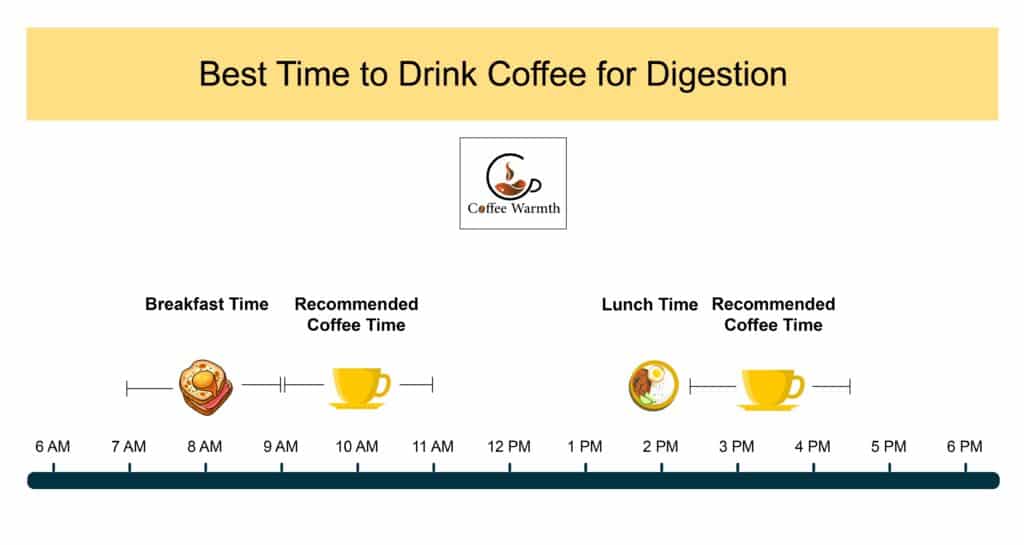
Should You Drink Coffee Before or After Breakfast?
You should drink coffee after breakfast because it helps you digest the meal as caffeine kick starts your digestion. It enhances digestion by moving the food in the entire colon.
Furthermore, drinking coffee before breakfast can raise blood sugar and stress hormone (cortisol) levels. Naturally, blood sugar and cortisol levels are raised in the morning. Drinking coffee further lowers insulin sensitivity and increases stress hormones. A study in the Journal Diabetologia states drinking caffeinated coffee decreases insulin sensitivity temporarily in all coffee consumers.
Moreover, drinking coffee before breakfast causes stomach irritation and makes you nauseous due to the secretion of gastric acid.
Does coffee before breakfast raise blood sugar?
Yes, drinking coffee before breakfast raises blood sugar because it lowers the insulin sensitivity by releasing adrenaline. Blood sugar levels are naturally higher in the morning and caffeine-induced insulin sensitivity further worsens it.
Professor James Betts from University of Bath, explains in his study, “Our blood sugar control is impaired when we drink coffee on empty stomach especially after a night of disrupted sleep. We might improve this by eating first and then drinking coffee later if we still feel the need for it.”
Some studies suggest that coffee before breakfast increases the already high levels of cortisol. Cortisol secretion leads to high blood sugar levels in both healthy and type 2 diabetics, according to a study in Diabetes Care Journal.
Can drinking coffee in the morning cause nausea?
Yes, drinking coffee in the morning can cause nausea if you have an empty stomach or are dehydrated. Coffee interaction with morning medications can also cause nausea.
Drinking coffee in the morning on an empty stomach stimulates gastric acid secretion which causes stomach irritation and nausea.
Coffee is a diuretic which promotes water excretion and makes you nauseous. According to a study in the General Hospital Psychiatry Journal, high coffee consumption causes nausea even in healthy individuals.
The interaction of caffeine in coffee with certain medications can cause nauseous effects. Dietitian and Clinical Herbalist Jenna Vlope says, “Nausea is one of many possible side effects of a caffeine-medication interaction”.
